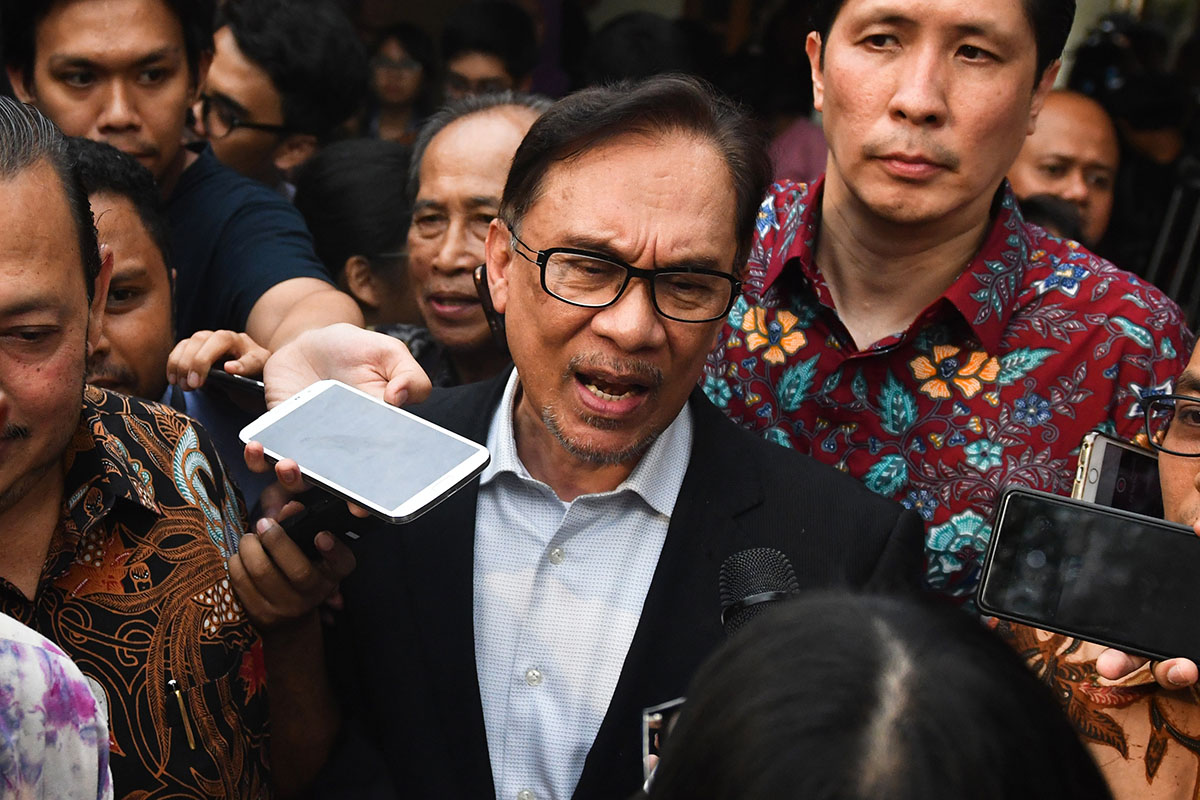Anwar Ibrahim has a simple message for ethnic Malays who fear losing benefits they enjoyed under the previous government’s six-decade rule: don’t worry.
Anwar, who is expected to replace 92-year-old Prime Minister Mahathir Mohamad in a year or two, said Malaysia must assure the nation’s largest racial group that its security would be upheld. Previously Anwar, 70, had called for affirmative action policies that favour ethnic Malays to be dismantled.
Mahathir Mohamad led the Alliance of Hope (Pakatan Harapan) coalition that Anwar founded to a surprise election win in early May, ousting former prime minister Najib Razak’s United Malays National Organisation (UMNO). Anwar’s coalition, which fell short in a 2013 vote after pledging to roll back racial preferences for the ethnic Malay majority, aligned with a staunch defender of the policy in Mahathir Mohamad.
“The Malay belt have rejected UMNO but are ambivalent and unsure about lending their support to the alternative multi-racial pluralistic Pakatan Harapan,” Anwar said in an interview with Bloomberg TV’s Haslinda Amin on Friday. “Which means we should be taking enough measures to try and reach them.”
In the northern states of Kedah, Terengganu and Kelantan – collectively known as the Malay belt – Parti Islam Se-Malaysia (PAS) won roughly 50 percent of seats up for grabs. The conservative Islamic party supported by ethnic Malays didn’t align with either Najib Razak’s coalition or Anwar’s group.
When pressed on whether he would repeal the affirmative action rules once he becomes premier, Anwar said he would “honour the guarantees” for ethnic Malays as set out in the constitution. He added that other races would also receive state support based on merit and need.
“We would of course protect the position of the Malaysian bumiputras in terms of giving opportunities, but not enriching them to become billionaires,” he said at his residence in Kuala Lumpur, shortly after being released from prison on a sodomy charge he said was politically motivated.
Two years after 1969 race riots that left hundreds dead, Najib Razak’s father Abdul Razak initiated Malaysia’s New Economic Policy (NEP), giving ethnic Malays cheaper housing and quotas for college scholarships, government contracts and shares of listed companies. It sought to raise the share of national wealth to at least 30 percent for Malays and indigenous groups known as bumiputras, or “sons of the soil,” which currently account for about 70 percent of the population.
Income inequality
While the NEP was only supposed to last 20 years, Mahathir Mohamad subsequently introduced the National Development Policy in 1991, that kept much of the affirmative action concepts intact. Since then, Najib Razak has tweaked the policy for publicly traded firms and extended benefits to poorer members of all races but has kept many other elements in place.
Anwar said he’s now focused on correcting economic inequality, which he said was worsened by Najib Razak’s government.
“To be realistic, there’s a good chance that many of these policies will continue, but possibly in a more even-handed way,” said Johan Saravanamuttu, an adjunct senior fellow at Singapore’s S Rajaratnam School of International Studies. “We have heard a move toward this idea of Malaysians are Malaysians, a move away from race divisions.”
Anwar’s ideological shift is another signal that the winning coalition may be more coherent than previously thought. Pakatan Harapan, which former premier Najib Razak described as a “motley collection,” is composed of four parties with contrasting views, including a majority ethnic Chinese party and a Malay nationalist party.
Corruption fight
To promote unity, Anwar has turned to the one cause that spans party and racial lines: rooting out corruption.
He said he’s willing to let Mahathir Mohamad, who previously ruled the country for 22 years, hold the reins for one to two years while he travels the world on speaking engagements.
“I think it would be great for me to assume office with the major task having been completed extremely well by Mahathir,” he said of the fight against corruption. Ridding the state of “leakages and opulences” would save up to RM30 billion (US$7.6 billion) a year, he said. That compares with the RM44.3 billion (US$11.22 billion) earned in 2017 from Najib Razak’s goods and services tax (GST), which the government scrapped last week.
‘Mellowed a bit’
Anwar’s reiteration of his support for Mahathir Mohamad and agreement with his policies stand in contrast to decades of enmity between the two men. Mahathir Mohamad dismissed him as his deputy in 1998 over debates on how to respond to the Asian financial crisis. Anwar was then jailed twice, once for committing sodomy and abusing power, and a second time for a subsequent sodomy conviction. He denied the charges.
“The Anwar we see today has mellowed a bit,” said Ahmad Martadha Mohamed, an associate professor at Universiti Utara Malaysia. “He has become more accommodative, more moderate and less radicalised than the Anwar of 20 years ago.”
Prison has changed him to better appreciate freedom and to look past democratic pageantry to see how economic policies affect the people, Anwar said in the interview, adding that he spent his time behind bars reading the likes of Shakespeare and Tolstoy.
Anwar said he’s wary that voters will see the new government as “UMNO 2.0” given it contains many former members, including himself. Still, he said, anyone who is seen as corrupt won’t be allowed in the new government in an effort to sustain support after the initial honeymoon period ends.
“Once it sinks in and the government can no longer sustain the euphoria, people will become more critical,” Anwar said. “Which is a good thing.” – Bloomberg
